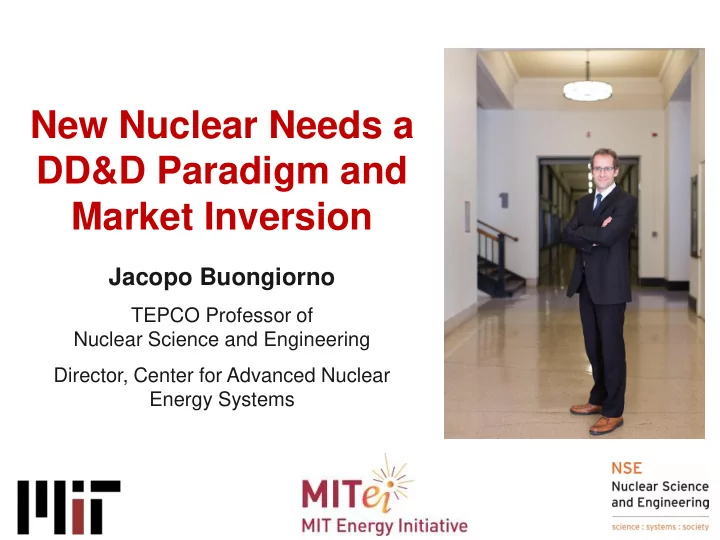

New Nuclear Needs a DD&D Paradigm and Market Inversion Jacopo Buongiorno TEPCO Professor of Nuclear Science and Engineering Director, Center for Advanced Nuclear Energy Systems
The Future of Nuclear Energy in a Carbon-Constrained World AN INTERDISCIPLINARY MIT STUDY Download the report at http://energy.mit.edu/studies-reports/
A “perfect storm” of unfortunate attributes System Factory Testing and High-return size fabrication licensing product Nuclear Plants Large No Lengthy No Coal Plants Large No Short No Offshore Oil and Gas Large No Medium No Chemical Plants Large No Medium Yes Satellites Medium Yes Lengthy No Jet Engines Small Yes Lengthy No Pharmaceuticals Very Small Yes Lengthy Yes Automobiles Small Yes Lengthy Yes Consumer Robotics Small Yes Short Yes has resulted in long ( 20 years) and costly ( $10B) innovation cycles for new nuclear technology
DD&D paradigm needs to shift to: smaller, serial- manufactured systems, with accelerated testing/licensing, producing high added-value energy products.
SMALLER SYSTEMS PUT LESS CAPITAL AT RISK Small Modular High Temperature Gas- Reactors Cooled Reactors Micro-Reactors [ Westinghouse’s eVinci ] [ X-energy ] <20 MWe [ NuScale , GE’s BWRX -300 ] <300 MWe Block core with heat pipes, <300 MWe Helium coolant, graphite self-regulating operations, Scaled-down, simplified moderated, TRISO fuel, Stirling engine or air- versions of state-of-the-art up to 650-700 C heat Brayton LWRs delivery
A SUPERIOR SAFETY PROFILE CAN REDUCE TIME AND COST TO LICENSING Demonstrated in De inheren ent t safety No need for attr tributes es: emergency AC • No coolant boiling (HTGR, Engin gineered power microreactors) passiv ive safety Long coping • Strong fission product retention systems: times = + in robust fuel (HTGR) – Heat removal Simplified design • High thermal capacity (SMRs & – Shutdown and operations HTGR) Emergency • Strong negative planning zone temperature/power coefficients (all concepts) limited to site • Low chemical reactivity (HTGR) boundary Design certification of NuScale is showing U.S. NRC’s willingness to value new safety attributes
BYPASSING NRC FOR EARLY DEMONSTRATION CAN SAVE A DECADE AND A BILLION DOLLARS NASA recently designed, fabricated and tested a small nuclear reactor (<1MW) for space applications at a total cost of <$20M, in less than 3 years
HIGHER ADDED VALUE FOR NUCLEAR CAN COME FROM 1. New policies that fully recognize the non- emitting nature, local economic impact, and contribution to energy security and grid stability of nuclear electricity AND/OR 2. Capture of new energy markets: - Process heat for industry (e.g., ammonia, vinyl chloride, soda ash, nylon, styrene) - Production of hydrogen or synthetic fuels for transportation - Power and heat for remote islands and communities, mining operations, military bases, disaster relief activities, data centers, etc. - Propulsion for transoceanic commercial ships - District heating - Water desalination
Where are the carbon emissions? From IPCC 2014 Much more than electricity!
In a low-carbon world, nuclear energy is the lowest-cost, dispatchable heat source for industry LCOH Technology Dispatchable Low carbon $/MWh-thermal Solar PV: Rooftop 190-320 No Yes Residential Solar PV: Crystalline 45-55 No Yes Utility Scale Solar PV: Thin Film Utility 40-50 No Yes Solar Thermal Tower with 50-100 Yes Yes Storage 30-60 No Yes Wind Nuclear 35-60 Yes Yes Natural Gas (U.S. price) 20-40 Yes No LCOH = Levelized Cost of Heat (LCOH)
A small (but not insignificant) potential market for nuclear heat in industry now 1/5 of global heat 240 million metric tons of CO 2 -equivalent per year demand in industry (>7% of the total annual U.S. GHG emissions) Methodology: • EPA database for U.S. sites emitting 25,000 ton-CO 2 /year or more • Site must need at least 150 MW th of heat Nuclear heat delivered at max 650 C (with HTGR technology) • • Heat from waste stream not accessible • Extrapolated U.S. data to World based on GDP and refinery capacity
In the transportation sector, hydrogen and/or electrification could create massive growth opportunities for nuclear New nuclear capacity required to decarbonize the transportation sector Country With electrification* With hydrogen** U.S. 285 GW e 342 GW e and 111 GW th France 22 GW e 28 GW e and 9 GW th 33 GW e 41 GW e and 13 GW th Japan 1060 GW e 1315 GW e and 428 GW th World * Assumes that (i) the efficiency of internal combustion engines is 20%, and (ii) the efficiency of electric vehicles is 60% ** Assumes that (i) the efficiency of internal combustion engines is 20%, (ii) the efficiency of hydrogen fuel cells is 50%, (iii) hydrogen gas has a lower heating value of approximately 121.5 MJ/kg, and (iv) the energy requirement for high-temperature electrolysis of water is 168 MJ/kg-H 2, of which 126 MJ/kg-H 2 is electrical and 41 MJ/kg-H 2 is thermal.
A more radical market inversion
The evils of the electric grid Supply (generators) and demand (end users) are geographically separated and static, requiring massive transmission infrastructure Complex interconnected system is vulnerable to external perturbations (e.g., extreme weather, malicious attacks) Capital-intensive equipment has low utilization factor because of variability in demand and intermittency in supply (e.g., back-up and storage, solar/wind overcapacity) Market is muddied by subsidies (e.g., renewables, nuclear) and un-accounted costs (e.g., social cost of carbon) Responsible for ¼ of global CO 2 emissions and large amounts of EPA criteria air pollutants W hy continue to play on natural gas’ and renewables’ home turf?
Co-located supply-and-demand (the wildcard opportunity) Mobile containerized production and processing (agro, aqua, pharma, 3D-printing, data centers, etc.) N uclear ‘battery’ + Stable Geographically Suitable for mobile Predictable Energy source Carbon-free output unconstrained deployment generation cost Nuclear (traditional) Yes Yes No No Yes Nuclear (micro-reactors) Yes Yes Yes Yes Yes Natural gas Yes No Yes Yes No Coal Yes No No No No Hydro No Yes No No No Solar/Wind No Yes No No No Can defeat the NG/renewables/grid stranglehold on economy and open new, enormous markets for nuclear
The opportunities for new nuclear are vast. There is hope after all!
Recommend
More recommend